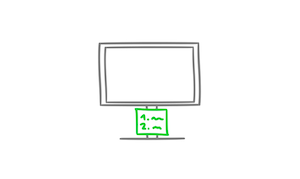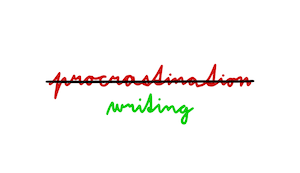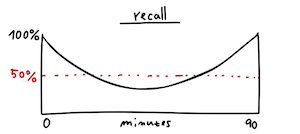Learn to tolerate discomfort or suffer escaping from it
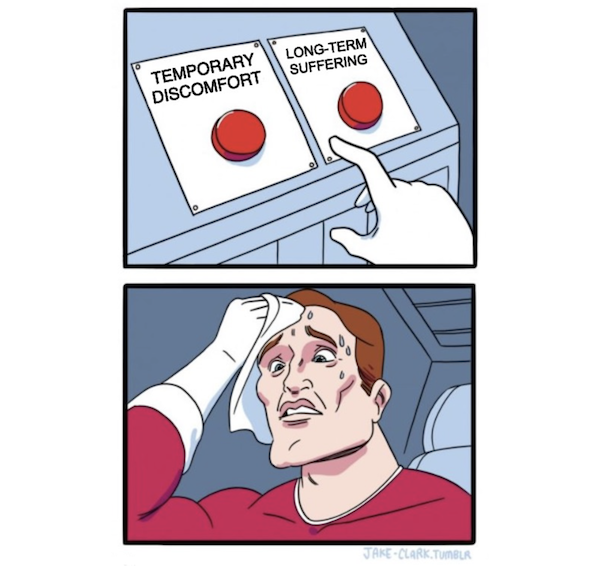
In the past, life was hard for everyone except the chosen few.
It was full of hard work, obligations, things to take care of all the time…
People would only have a bit of time for leisure every now and then (e.g. Sunday afternoon).
Today, you can have more free time than ever, you can buy everything online (fairly cheap) and have it delivered to your door. You don’t have to leave your house at all.
This fosters a view of reality in which you won’t have to deal with discomfort ever again. Everything will be convenient, available with just a couple of taps.
Multiple factors promote this view:
- Marketing supports this message
“You don’t have to cook, it takes so much effort. Just order food delivery right now with our new app! You deserve it!” - Instant gratification culture
Modern technologies and services train us to expect everything to be quick. Why make an effort and go for a hike when you can just look at the views from a summit on Instagram? - Social media reality distortion
We don’t see the years of work, we only see the results—a photo of a skinny before and a buff after. We don’t see the 5 years of gradual progress it took to get there. - Generally, we have more time for leisure because everything else is easier.
- Previous generations experienced a lot of boredom (discomfort) throughout the day while we can be entertained by screens 24/7
And so, discomfort of any sort becomes undesirable. Discomfort = bad.
However, we often go too far with this “no discomfort” mindset and we create new problems by taking being comfortable to the extreme.
Examples:
Obesity - The cost of food has been radically reduced, while the need for physical exertion has been largely eliminated - many people just sit all day, at work and at home.
Addiction to modern technology - We have an infinite variety of interesting information available to us 24/7, while many of us have more free time than ever before.
Escaping from discomfort turns into suffering
The thing is, we wither without challenge. No challenge, no progress. No progress, no meaning. It turns into an existential crisis fast.
And if we wither for too long, we create more suffering for ourselves. We have to pay a much higher price:
- Avoiding physical exercise, getting fat → being frail, weak, aching body, illness, health deterioration
- Not processing difficult thoughts or events → being unable to tolerate your own emotions, search for coping mechanisms (drugs, compulsive behaviors)
- Escaping from responsibility → responsibilities don’t vanish, they just pile up
In the end, there is no joy in always being comfortable.
There’s a reason people who “made it” and don’t have to work another day of their life don’t sit on their asses and entertain themselves. They choose to work because it makes their life more meaningful. They usually keep on challenging themselves and start pursuing different endeavors.
Examples:
The day I became a millionaire
The truth about retiring at age 31 with $100,000,000
290: The Financial Freedom Paradoxes
Great News – Early Retirement Doesn’t Mean You’ll Stop Working
Having a choice is an advantage
Now, if you’re reading this, you probably have a choice to be challenged or not.
Most people in the past didn’t have the choice (and a lot of people still don’t nowadays). Most people in the past were simply challenged by life. For example, they had to work in a physically exhausting job for 12 hours to survive. Today, many of us can choose to go to the gym or not.
Or we can choose to eat or not. Having that choice vs not having it is the difference between fasting (voluntary) and starving (involuntary).
When we have a choice to experience discomfort or not, it allows us to tailor the difficulty to our abilities and adjust. We can work out, build our bodies, if we injure ourselves, we can take time off. Whereas if you got injured on the 12-hour job, you probably had to keep on going or your family would be starving.
Discomfort makes things rewarding
Now, we’ve talked about how not experiencing discomfort makes you suffer in the long run, but there is another argument for choosing to be challenged: it makes you feel good about how you spend your time.
When you choose to work out in the morning instead of doing nothing, you’ll feel good afterward, physically and mentally.
When you choose to study instead of scrolling TikTok for 2 hours, you’ll feel great afterward.
When you choose to finally approach that one big task on your to-do list instead of avoiding it and make progress as a result, you’ll feel awesome.
Of course, the first 5-15 minutes will feel uncomfortable, not as fun as scrolling social media, but if you persist, you’ll shift into focus mode and become engaged. And afterward, you’ll feel great about it.
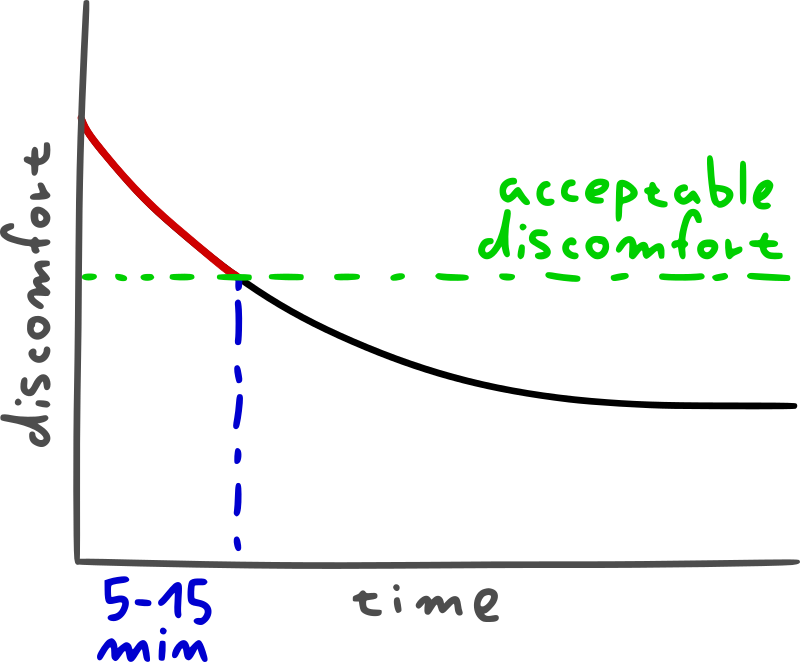
So this is the positive angle on why you should choose to get uncomfortable: it makes you feel good afterward, it makes you feel like you spent your time well.
So here’s the why tolerating discomfort is an important skill, explained from two viewpoints:
- Avoiding hard things only makes you suffer in the long term, physically and psychologically. It makes you regret how you spent your time.
- Engaging in uncomfortable things makes you feel better afterward. It makes you feel good about how you spent your time.
Now let’s get into the daily practice of how to get used to being challenged after you’ve been stuck in Comfortland for a while.
How to learn to tolerate discomfort?
The basic principle is: do hard things.
We wrote about choosing to do hard things here but here's the short version:
Every time you choose to work even though you want to procrastinate, you increase your ability to tolerate discomfort and it’s a bit easier to not procrastinate the next time.
This can though be overwhelming so you can practice doing hard things in different areas of life.
Do any form of physical exercise
The goal here is to slowly go beyond what’s comfortable. It doesn’t matter where you begin. Slowly ramp up the difficulty and keep challenging yourself, bit by bit.
If going on walks isn’t comfortable for you - start there.
If walking is easy, jog for a mile or 2 or go for a hike.
If running a 5k isn’t that hard, go for 10k.
No matter where you currently are, there is a way to challenge yourself.
If you don’t go to the gym, getting there or starting to work out at home is a good way to challenge yourself.
All the above is nice and dandy but you’ve probably heard 1000 times that physical exercise is good. But if you want to learn to tolerate a lot of discomfort quickly, start with sports where you have to deal with adrenaline (fear):
- Martial arts - ideally the ones where you get to spar with other people - have you heard about Brazilian jiu-jitsu? (sorry, but it’s the first rule of BJJ - always talk about BJJ)
- Rock climbing
- Ski mountaineering
- Paragliding
- Downhill mountain biking
What you can do depends on where you live and your budget.
It might feel uncomfortable at first but from our experience, it transforms one's brain so we’re much more used to doing uncomfortable things.
Practice voluntary discomfort
We’ve already covered voluntary discomfort here, but the basic activities that help you get used to tolerating discomfort are:
- Cold showers and cold water immersion
- Sauna
- Fasting - intermittent, 24 hours, 48 hours, multiple days,...
All of these also have health benefits.
Learn to sit with your emotions
Generally, you want to become more mindful because then you can better notice emotions and thoughts or even realize you’re having them.
Mindfulness and meditation also teach you to stay with emotions and just observe them, then let them go instead of acting on them if they don’t serve you.
This is, of course, a lifelong journey of learning but we can definitely improve quite a bit in a few weeks.
You can also practice processing your emotions better deliberately by:
- Input free time
- Meditation
- Journalling
Summary
So this is it. Learning to tolerate discomfort, or even voluntarily choosing it, is one of the most important skills you can learn. It will help you better handle unpleasant things that happen to you and also make you more resilient.
And remember: if you try to escape every little bit of discomfort, you will only suffer in the long run.

